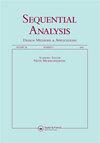用于有效蒙特卡罗积分的序列分层分裂
IF 0.6
4区 数学
Q4 STATISTICS & PROBABILITY
Sequential Analysis-Design Methods and Applications
Pub Date : 2021-07-03
DOI:10.1080/07474946.2021.1940493
引用次数: 2
摘要
摘要从理论和实践的角度来看,高维积分的有效评价都很重要。特别是,多维集成在贝叶斯推理、统计物理学、数据科学和机器学习中发挥着核心作用。然而,由于维数的诅咒,确定性数值方法在高维环境中效率低下。因此,对于许多实际问题,必须求助于近似估计技术,例如蒙特卡罗方法。在本文中,我们介绍了一种新的序列蒙特卡罗算法,称为分层分裂。该方法提供了无偏估计,并且可以处理包括指示函数在内的各种被积函数类型,这对于罕见事件概率估计问题很重要。我们对所提出的方法的效率进行了严格的分析,并对应用于实际应用领域时的算法性能进行了数值演示。我们的数值实验表明,分层分裂方法能够为各种积分问题提供准确的结果,同时需要合理的计算工作量。本文章由计算机程序翻译,如有差异,请以英文原文为准。
Sequential stratified splitting for efficient Monte Carlo integration
Abstract The efficient evaluation of high-dimensional integrals is important from both theoretical and practical points of view. In particular, multidimensional integration plays a central role in Bayesian inference, statistical physics, data science, and machine learning. However, due to the curse of dimensionality, deterministic numerical methods are inefficient in the high-dimensional setting. Consequentially, for many practical problems one must resort to approximate estimation techniques such as Monte Carlo methods. In this article, we introduce a novel sequential Monte Carlo algorithm called stratified splitting. The method provides unbiased estimates and can handle various integrand types including indicator functions, which are important for rare-event probability estimation problems. We provide rigorous analysis of the efficiency of the proposed method and present a numerical demonstration of the algorithmic performance when applied to practical application domains. Our numerical experiments suggest that the stratified splitting method is capable of delivering accurate results for a variety of integration problems while requiring reasonable computational effort.
求助全文
通过发布文献求助,成功后即可免费获取论文全文。
去求助
来源期刊

Sequential Analysis-Design Methods and Applications
STATISTICS & PROBABILITY-
CiteScore
1.40
自引率
12.50%
发文量
20
期刊介绍:
The purpose of Sequential Analysis is to contribute to theoretical and applied aspects of sequential methodologies in all areas of statistical science. Published papers highlight the development of new and important sequential approaches.
Interdisciplinary articles that emphasize the methodology of practical value to applied researchers and statistical consultants are highly encouraged. Papers that cover contemporary areas of applications including animal abundance, bioequivalence, communication science, computer simulations, data mining, directional data, disease mapping, environmental sampling, genome, imaging, microarrays, networking, parallel processing, pest management, sonar detection, spatial statistics, tracking, and engineering are deemed especially important. Of particular value are expository review articles that critically synthesize broad-based statistical issues. Papers on case-studies are also considered. All papers are refereed.
 求助内容:
求助内容: 应助结果提醒方式:
应助结果提醒方式:


